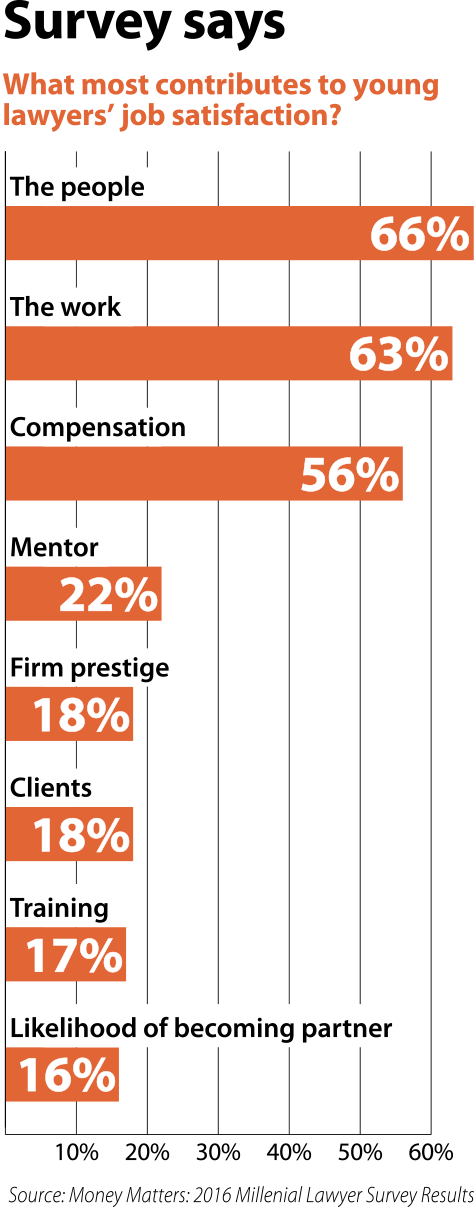Subscriber Benefit
As a subscriber you can listen to articles at work, in the car, or while you work out. Subscribe NowIt’s no secret being a new lawyer is tough.
 Law school generally doesn’t prepare future lawyers for the long hours they’ll work, the business demands they’ll juggle and the high-stakes decisions they’ll make. Thus, when they make the transition from student to lawyer, young attorneys often struggle to find their footing and may even question whether they made the right career choice.
Law school generally doesn’t prepare future lawyers for the long hours they’ll work, the business demands they’ll juggle and the high-stakes decisions they’ll make. Thus, when they make the transition from student to lawyer, young attorneys often struggle to find their footing and may even question whether they made the right career choice.
Indeed, a recent survey of young Florida attorneys found that roughly 58 percent say the practice of law has become “less desirable” to them as their years in practice have increased. That result doesn’t surprise young Hoosier attorneys, who say they are all too familiar with the difficulties of finding your place in the legal profession.
But facing difficulties doesn’t mean the next generation of Indiana lawyers are preparing to switch careers. Rather, they say the struggles they encountered, though painful at the time, have improved their skills as client advocates.
The right fit
It’s been eight years since Schuckit & Associates attorney Andrew Lehmann graduated law school, but he still remembers being surprised by the adversarial nature of litigation when he first started practicing.
During his law school years, Lehmann’s professors preached the importance of civility. But in the real world of commercial litigation, he quickly realized civility is not as important to everyone.
Dealing with adversarial opponents was one of the biggest hurdles Lehmann faced as a new lawyer. But for him, litigation was the right fit, so he learned to deal with contentious opponents by showing up to court, doing his job and making an effort to be cooperative with even the most uncooperative opponents.
But not every attorney will deal well with the adversarial nature of litigation, Lehmann said, and it’s not wise for young attorneys to force themselves into a practice area that doesn’t suit them.
“I think that’s something that’s hardest to get over, especially in the litigation context where a lot of people realize, ‘Litigation isn’t for me, I’m more of a transactional attorney where it’s less contentious,’” he said. “That’s fine. Adapting to the profession doesn’t mean jamming a square peg into a round hole.”
***
As a sought-after expert on young attorney job acclimation, author Grover E. Cleveland has seen firsthand the importance of young attorneys finding the right fit. He remembers his own transition from law school to law practice as “abrupt.”
 Cleveland
ClevelandOne of the most important goals for a junior attorney should be finding a practice area they enjoy and people they enjoy working with, Cleveland said. He’s a strong believer in the Simon Sinek quote, “Working hard for something we don’t care about is called stress; working hard for something we care about is called passion.”
To that end, Cleveland said associates should actively seek work from partners whose interests and work styles align with their own.
“I do think you have to start broadly and take what’s out there,” Cleveland said of associate assignments. “… But as associates progress they need to be very thoughtful and strategic in terms of projects that will help them grow in the areas they want to grow in, and they need to proactively seek out work and build relationships from people they will enjoy working with and who will invest in them.”
Giving guidance
 Winingham
WininghamIt’s a situation no attorney ever wants to be in. W. Kent Winingham, just a couple years out of law school, was called out by a judge and made to read in open court, in front of an audience, a court order he had apparently violated.
It was an embarrassing situation, but it was how Winingham learned. As an associate at a Chicago personal injury firm, Winingham, now of Wilson Kehoe Winingham in Indianapolis, learned to be a lawyer by doing the things that lawyers do. In his first years after graduating law school in 2015, Winingham took depositions, litigated cases in court and tried to absorb the positive attributes he saw in his older colleagues.
Sometimes he failed, sometimes he succeeded, and always he asked questions. But since he was at a larger firm, Winingham said there wasn’t a formal structure in place to help new attorneys learn the ropes.
“It was really good to have to think about things on my own with no one holding your hand,” Winingham said. “But it was a blessing and a curse.”
The blessings came from forcing Winingham to think critically, but the curses came when he slipped up. The young attorney would have appreciated more guidance on litigation strategy, but even so, he says he’s a better lawyer now because of his early independence.
***
 Williams
WilliamsAs Bingham Greenebaum Doll’s chief legal talent officer, Shannon Williams is familiar with the struggles new attorneys face. They’re learning to be professionals, trying to find the right practice area and figuring out how to balance their professional and personal obligations.
Part of Williams’ job is to help Bingham find associates who will fit the firm’s expectations. Once those attorneys are found, she switches to a guidance role and strives to provide associates with the professional development tools they’ll need to succeed.
On the front end, she trains the firm’s interviewers to look for characteristics in associate candidates that would indicate success at Bingham. Then, after an attorney is hired, she works to pair the associate with a partner mentor who can provide professional guidance tailored to the associate’s needs.
Mentors are not arbitrarily assigned, Williams said — she strives to pair attorneys who share common interests. Associate candidates have almost come to expect this kind of guidance, she said, noting many will ask what kind of mentor and professional development programs a firm offers before accepting a job.
“They’re aware that they’re going to need additional tools, that they’re not just graduating from law school, that law school hasn’t necessarily prepared them for what it’s going to be like to practice law and the rigors that go with that,” Williams said.
Striking a balance
 Cragen
CragenTara Cragen knew associates at bigger law firms worked nights and weekends, but she didn’t expect the same from a smaller firm. Sure, being a lawyer always involves long hours, but as an attorney at a firm with less than a dozen lawyers, Cragen’s biggest struggle in her first year of practice has been time management.
It’s not that Cragen doesn’t get her work done. But as a mother of two and with only one year of experience, the Nice Law Firm attorney said it’s been tough learning to balance her professional and personal responsibilities.
Cragen loves being a lawyer, so the workload doesn’t intimidate her. But she knows young attorneys can feel burned out. Still, from her perspective, the key to avoiding burnout is as simple as changing your perspective.
“It’s all attitude,” she said.
Being a new lawyer is overwhelming, Cragen said, but mastering time management comes from viewing a hefty workload as an opportunity to learn. You spend three years learning the basics, she said, but once you get into the real world, you’re given the opportunity to flex your muscles and put your knowledge into practice.
***
Cleveland has worked with associates who were prepared to quit the law before they learned how to manage their time.
New attorneys are initially unaware of how long projects will take them and will thus become overwhelmed by multiple deadlines, he said. Part of the time management struggle comes from a lack of control, the author said — young lawyers have multiple partners vying for their attention, and it can feel as though they have no say over how their time is spent.
“If there’s no end in sight,” he said, “it can be demoralizing.”
But once they get a grasp on their expectations, Cleveland said associates’ perspectives can completely change.
Part of the training Cleveland offers is on negotiating deadlines and the scope of projects. As associates learn their limits and understand their workloads, they can more clearly communicate their time management needs to their partners.
That shift makes attorneys feel more in control, Cleveland said, which will make them feel more satisfied in their work.•
Please enable JavaScript to view this content.
